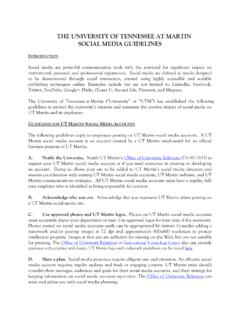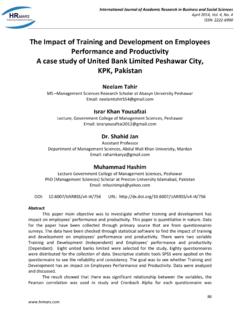Transcription of The Challenge of Social Work in Africa:Starting the ...
1 The African e-Journals Project has digitized full text of articles of eleven Social science and humanities journals. This item is from the digital archive maintained by Michigan State University Library. Find more at: Available through a partnership with Scroll down to read the article. Journal of Social Development in Africa (1993). The Challenge of Social Work in Africa:Starting the Indigenisation Process KW AKU OSEI - HWEDIE*. ABSTRACT. This article puts a case for the indigenisation of Social work in Mrica. The need for indeginisation is based upon the realisation that Social work in Africa has failed to respond appropriately to the major Social problems confronting the region.
2 The Social work profession is heavily influenced by Western theory and no meaningful attempts have been made to ensure that the profession fits into the Social , economic and practical environment in which it operates. The article therefore emphasises the need for the Social work profession to redefme itself and assume a new character. It is suggested that Social work should adopt a development approach which in essence requires Social workers to play a variety of roles within the framework of Social development In order to fulftl this function, to a reorientation in the training of Social workers is necessary including a reappraisal of the knowledge, values and skills necessary for meaningful and appropriate Social work intervention.
3 Introduction The manner in which the processes of Social development and change are conceptualised shape the Social poliC(iesand programmes of a country (UN, 1987). To a greater extent, policies and programmes are also affected by the choices a so- ciety makes in any given Social and physical environment. It has been stressed that African countries are beset with a "crisis of inadequacy" due to the fact that development is influenced by colonial experience, and Western theories of mod- ernization and economic growth. These factors have again led to the lack of fit between traditional Social norms and Western processes of Social welfare, result- ing in qualitative changes without Social justice - Social equity.)
4 For example, this is demonstrated by imbalances in the provision of Social services - education, health, recreation, etc between urban and rural areas (UN 1987). *Professor. Dept of Social Work, University of Botswana. 20 Kwaku Osei - Hwedie Since the 1970's the African socio-economic crisis, as underlined by the drought and famine of 1980 - 85; the current drought in Southern Africa; war, famine and extensive mass dislocation in Somalia; geneml high mte of urbanisa- tion; infant mortality, high population growth; iIIitemcy; unemployment; lack of essential services; increasing poverty of the masses, etc has worsened (UN, 1987).
5 The Structural Adjustment Progmmmes (SAPs), together with the associ- ated privatisation being undertaken by a number of countries such as Ghana, Zambia, Zimbabwe and Tanzania, have not provided any answers to the problem. If anything at all, the immediate impact has been a worsening of the situation for many Social groups in the short term (Osei-Hwedie, 1992; Osei-Hwedie et al, 1992). With deepening socio-economic crises, many African countries have failed to meet the needs of their populations, especially within the current context of Social provision. African strategic planning, demonstrated, for example, through the Lagos PIan of Action and the UNProgrammeof Action for Economic Recovery and Development 1986 - 1990, haveemphasised strategies "that focus attention on the major Social issues, the development of human resources and the needs of special population groups, particularly women and youth" (UN 1987: 3).
6 It is within this context that the current and future role of Social provision must be examined and projected. The fact that Social work objectives and principles support Africa's objectives for Social development is not in question. For example, the Lagos Plan of Action, asserts that: A primary objective of socio-economic development is the improve- ment oflife for the entire population of a nation. The attainment of this ob- jective requires full participation of all segments of the population in gain- ful and productive employment and provision of all essential services for enrichment of life of the community (UN, 1987: 3).
7 Despite this seemingly perfect alliance between the strategic plans and the objectives of Social work pmctice, these strategies are beset with implementation problems and thus little progress has been made. The UN (1987) has recommended that for progress to be made, policy must target the mass of the population who reside in ruraI areas; reorganise and strengthen the urban informal sector; rebuild and refocus the capacities of Social institutions, policies and programmes; and capture the historical, socio-political and economic experience and realities as well as the cultumI heritage of Africans.
8 It is believed that Social work has a central role to play in this (Osei-Hwediel991), but in order to be effective, it has to shed its foreign character and perhapsredefme its central focus, knowledge and value bases (Mupedziswa, 1992; Taback, 1991; Midgley, 1990, 1981; Khinduka, 1971). Following this tradition of questioning the process and trying to refocus The Challenge of Social Work inAfrica 21. Social work practice in Africa, this paper explores some of the basic but fundamen- tal issues which the Social work profession must resolve in order to be responsive and more ~levant to African socio-economic development The question that underlies this discussion is: what are some of the requirements of what Midgley (1981) refers to as the "principle ofindigenisation", or "appropriateness''?
9 Mupedziswa (1992) argues that Social work practice must capture issues and problems which traditionally have been conceptualised as being outside the domain of Social work. Thus he implores the Social work profession to be imagi- native and flexible in order to be relevant and ready for the year 2000 and beyond. Thus the Social work agenda should capture problems related to unemployment, refugees, AIDS, Ecology and Structural Adjustment Programmes. To be able to handle these and other problems, Social workers must have the necessary skills through proper education which also prepares practitioners to anticipate and respond effectively to future problems and demands (Ankrah, 1987; Mupedziswa, 1992).
10 Along the same lines, Osei-Hwedie (1990) has pointed to the need for Social work to adopt a developmental approach as its basis of practice, and that by the nature of the profession Social workers must play multiple roles in the Social development process. Again writers ~uch as Midgley (1990) point to the develop- ment of strategies and services which rely on local community expertise and resources as opposed to services based on institutionalisation and public assis- tance. Basis of Practice and Training The need to clarify the basis of Social work practice in Africa is an urgent one.









